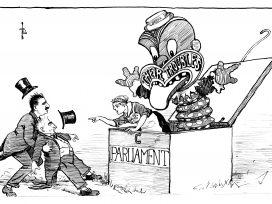Andrei Pavlishin, editor at the Ukrainian newspaper Lvivska Gazeta, describes how the tax police tries to get to the Ukrainan media.
Europe ends somewhere in the Ukraine – and then Russia begins. Literally, the Ukraine means borderland or frontier, and a frontier is what the country is today. Tensions between the western and eastern parts of the country became prominent during the last presidential elections – which in fact was a vote to choose between east and west, between a closer association to Russia and a closer association to Europe.
A majority of the population in western Ukraine voted for the opposition leader, the former prime minister Viktor Yushchenko, who stands for a closer relationship with the EU. In the eastern part of the country, however, a similar number voted for prime minister Viktor Yanukovitch, the regime’s candidate who prefers strengthening ties with Russia. President Vladimir Putin has offered his active support to the latter.
The capital city of western Ukraine is Lviv, previously Lwów (in Polish), Lemberg (in German), and Leopolis (in Latin). Lviv is probably the most Hapsburgan city on the face of the earth, with a pristine 19 century city centre where car traffic is the only sign of modernity. Lvivians want to belong to Europe.
Revolutionary legacy
As in Russia, Ukrainian media is mostly controlled by the state. The most independent newspaper is probably Lvivska Gazeta in western Ukraine. Second chief editor Andrei Pavlishin says the newspaper is only two years old and is therefore free of any Soviet baggage.
– We follow Western journalistic principles, he says. We try to be independent and open to all opinions and we are critical of local government.
The newspaper was founded by two men who were part of the student rebellion in the beginning of the 90s – the popular front in western Ukraine that was first to demand that the Ukraine should seek independence from a disintegrating Soviet Union. Many who were part of that movement have since become successful businessmen, funnelling profit to support socially beneficial projects. One of the founders of the newspaper owns an art gallery and runs a few cafés, the other founder manufactures clothes that also go to export. Both are around 30.
– The idea for the newspaper came when they realized no Ukrainian language daily meeting international standards really existed, says Pavlishin. There were good weeklies and monthlies, and Russian journals, but no dailies. We supported the interests of the middle class and of business entrepreneurs, and this quickly got us into trouble with state officials that were corrupt and mismanaged.
The powerbrokers
The Ukraine has its share of oligarchies, as in Russia, but unlike their neighbour, Ukrainian oligarchs have economic and direct political clout, some even hold seats in parliament. The three most important oligarchs have a regional base:
The Donetsk group is clearly the most influential and is headed by Rinat Achmetov, a businessman who owns System Capital Management, the largest company in the country, based in the metal industry. Prime minister Yanukovitch also belongs to this clan, as do the ministers for energy and finances. The oligarchy’s parliamentary arm, the Regions, occupies 65 out of 450 seats.
Financial head of the Dnyepropetrovsk group is Viktor Pinchuk, owner of the metal company Interpipe and three TV channels. The group has 40 MPs led by Serhiy Tyhypko, chief of the national bank.
The Kiev group is headed by businessmen Hrihori Surkis and president Leonid Kuchma’s chief of staff Viktor Medvedchuk, chairman of the united social democratic party, with around 40 seats in parliament. The group controls state-owned but not privately-owned companies. Medvedchuk runs the three largest television stations and has huge influence within the police corps.
Power without accountability
According to Pavlishin, Kuchma has been a very weak president and statesman, yet enormous power is connected to his position.
– His administration acts in the name of the president without constitutional backing. Heading the administration is the oligarch Viktor Medvedchuk, who is as powerful as the president himself, except that he is neither elected nor liked. He is someone who is used to getting his way.
Pavlishin, a historian, likens the united social democratic party to a construct not unlike Mussolini’s corporative system, with representatives holding the most important positions and a structure that is pervasive.
– The party also controls business and mass media, it’s almost a totalitarian state apparatus. Businessmen who support the party are bestowed an array of privileges, like tax relief. Those who don’t fall in line are subjected to constant inspections.
Viktor Medvedchuk’s brother Sergei used to be head of the tax department in Lviv, so when local tax officials were criticized in the Lvivska Gazeta, an open “war with the centre of power” broke out, a war fought in the courts among other places.
– The courts are not independent, it is difficult to get cases handled objectively. The same applies for the police. But it is possible, and necessary, to fight back.
During the two years since the paper was founded, 16 indictments have been brought against the Lvivska Gazeta. It’s not as bad as it sounds. Parliament has shown leniency towards the media, and no monetary sanctions can be imposed, only obligations to publish apologies and additional information. On the other hand, negative information can, by law, only be published once a person has been found guilty in court.
– Discussions that call on the government to intervene in cases of power abuse can therefore not be taken up by the media. Journalists are not allowed to collect evidence and the police are completely controlled by the regime. If an official with a minimal salary is living it up like an oil sheik we cannot write about it.
Tax prisons
The foreign press is of course much freer. In 2003, a Polish newspaper ran an article dealing with problems in western Ukraine. It was translated and published in the Lvivska Gazeta. One of the persons mentioned in the article took legal action and the paper was forced to distance itself from the information it had published.
– Everyone in the country understood what was going on. After that, Sergei Medvedchuk was transferred to Kiev, and although he got a higher position, higher salary, medals and honours, we took it as a minor victory. By the way, he is a professional athletic coach, he has no training whatsoever in tax issues. Similarly, the head of customs in western Ukraine, a high-ranking military officer slightly over 30 years of age, is in fact an agronomist. The more you criticize them, the higher positions they are given.
But then the government changed its tactics. Now the paper is left to its devices, instead the heat has been turned up on its owners.
– They are constantly subjected to different types of harassment. Tax officials should be making sure people pay their taxes, something simple enough to verify. But here, when they get suspicious, they send the tax police, men in black who break in and confiscate documents. The prime minister is poorly guarded – you can throw eggs at him – but we have the mightiest tax officials in the world, who take on whomever they wish and who even have their own prison. It has happened a couple of times that the tax police with masked and armed men wearing black uniforms comes and forces everyone on the ground, finds some documents and disappears.
Pavlishin himself was once present when tax policemen paid a visit to the paper and took one of the founders off to jail.
– It was right before new year’s, they probably thought that at such a time no one would pay attention and that they would be able to hold him over the holidays. But some of the people who were active during the revolution in 1990 whipped up such a storm of protests that the police held him for only a few hours. Now they are trying to get him fined 4 million hryvnia (EUR 570,000).
Tax officials don’t seem to have found much, the charges against Markiyan Ivashchichin are in fact quite absurd. He is accused of allowing his apparel company to pay for a loud-speaker advertisement at a rock concert that according to tax officials was never broadcast. They claim to have witnesses that never heard the ad… It wouldn’t be too difficult to agree with Pavlishin when he says that it is hardly the responsibility of the tax officials to determine whether ads are effective or not. Tax officials believe Ivashchichin paid the concert organisers without getting anything in return, something they obviously consider a crime. The crime may be that he supports Ukrainian rock music.
– Markiyan has supported many Ukrainian rock bands that have become important alternatives to the Russian pop that dominates the Ukrainian market.
Published 17 December 2004
Original in Swedish
Translated by
Patsy Nakell
First published by Ny Tid 46/2004, 9 November 2004 (Swedish version)
Contributed by Ny Tid © Ny Tid Eurozine
PDF/PRINTNewsletter
Subscribe to know what’s worth thinking about.



